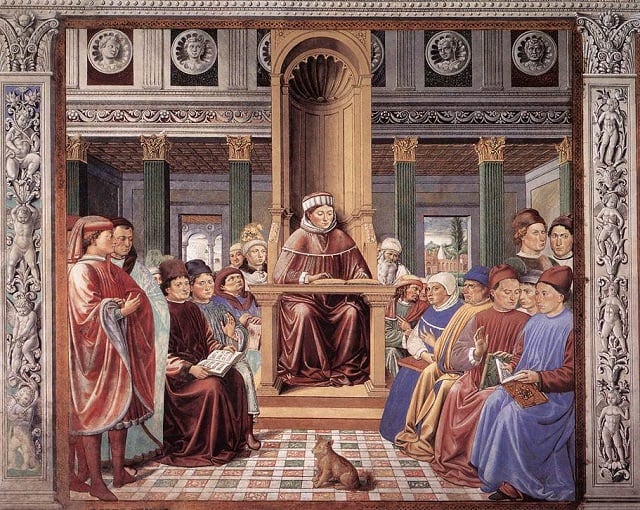
Norman L. Geisler (1932 – 2019) was an American evangelical Protestant theologian, philosopher, and apologist. He obtained an M.A. in theology from Wheaton College and a Ph.D. in philosophy from Loyola University, and made scholarly contributions to the subjects of classical Christian apologetics, systematic theology, philosophy of religion, Calvinism, Catholicism, biblical inerrancy, Bible difficulties, biblical miracles, the resurrection of Jesus, ethics, and other topics. He wrote or edited more 90 books and hundreds of articles.
Dr. Geisler was the Chairman of Philosophy of Religion at Trinity Evangelical Divinity School (1970–79) and Professor of Systematic Theology at Dallas Theological Seminary (1979–88) and a key figure in founding the Evangelical Philosophical Society. He also co-founded Southern Evangelical Seminary. He was known as an evangelical Thomist and considered himself a “moderate Calvinist”. He was not an anti-Catholic (i.e., he didn’t deny that Catholicism was fully a species of Christianity).
This is one of a series of comprehensive replies to his book, Roman Catholics and Evangelicals: Agreements and Differences (co-author, Ralph E. MacKenzie, graduate of Bethel Theological Seminary-West; Grand Rapids, Michigan: Baker Academic, 1995). It’s available online in a public domain version, which has no page numbers, so I will utilize page numbers from my paperback copy, for the sake of full reference. I consider it the best Protestant critique of Catholicism (especially in terms of biblical arguments) that I have ever found, from any time period. The arguments are, for the most part, impressively presented, thought-provoking, respectful, respectable, and worthy of serious consideration (which I’m now giving them).
I’ll be concentrating on the eight sections of Part Two: “Areas of Doctrinal Differences” (202 pages). These installments will be listed and linked on my Calvinism & General Protestantism web page, in section XVII: “Catholics and Protestants” (second from the end). Dr. Geisler’s and Ralph MacKenzie’s words will be in blue. My biblical citations are from RSV.
*****
The purpose of a sacrament is to bestow the grace of God . . . Thus, the sacraments are necessary for salvation. The Council of Trent reminded Catholics that “If anyone shall say that the sacraments of the New Law are not necessary for salvation, but are superfluous, and that, although all are not necessary individually, without them or without the desire of them through faith alone men obtain from God the grace of justification: let him be anathema.” Protestants, of course, take exception with this. (p. 252)
It’s absurd to make a broad statement about alleged Protestant antipathy to the sacraments, when I just documented in installment #10 that Martin Luther, John Calvin, John Wesley, Anglicanism, Churches of Christ, and Disciples of Christ all tied baptism to regeneration and salvation, and (minus the last two) also connected the Eucharist directly to salvation. We’re talking about the very founder of Protestantism (and Lutheranism that stemmed from him), the most historically influential Protestant (Calvin), and the large Anglican / Methodist sector that all agree with us regarding two major sacraments.
The argument for seven sacraments scarcely needs critique; the lack of scriptural and historical support speaks for itself. There is no real basis in the Bible, the Fathers, or church councils for the enumeration of seven. (p. 258)
If we are talking about individual Church fathers acknowledging all seven, yes, that is difficult to find, and the complete idea of seven rites described as “sacraments” was slow to develop (along with many other doctrines). But I have provided evidence that, for example, St. Augustine (354-430), the greatest Church father, arguably discussed and accepted all seven. And much patristic support can be found for each of the seven sacraments considered individually: for the beliefs entailed, whether or not each person specifically calls each a “sacrament.” Joe Gallegos and several others haves collected much data concerning this:
The Church Fathers on Baptismal Regeneration (by Bryan Cross)
The Church Fathers and Born Again
The Church Fathers and Transubstantiation
The Church Fathers and Confession
The Church Fathers and Holy Matrimony
The Church Fathers and Holy Orders
The Church Fathers and Confirmation
The Church Fathers and Anointing of the Sick
I have also, myself, defended each of the seven sacraments from Scripture alone:
14 Bible Verses That Show We’re Saved Through Baptism [National Catholic Register, 11-30-21]
20 Ways the Bible Affirms the Real Presence of Christ [National Catholic Register, 5-27-25]
Biblical Teaching on the Sacrament of Confirmation [2013]
Sacrament of Anointing / Extreme Unction: The Biblical Evidence [2009; Addendum added on 1-10-17]
Sacrament of Holy Orders (Ordination): The Biblical Evidence [5-9-08]
Confession and Absolution Are Biblical [National Catholic Register, 7-31-17]
Sacrament of Matrimony: Bible & Fathers (vs. Calvin #55) [12-23-09]
If each and every argument above is valid, then there is biblical support for seven sacraments. In that logical sense, Geisler is dead-wrong on both counts.
Catholic scholars claim that seven sacraments exist in Scripture implicitly like the Trinity does. This is a false analogy since all the premises from which the Trinity is derived are taught explicitly in Scripture, namely: (1) there is one God, and (2) there are three persons who are God: Father, Son, and Holy Spirit. Hence, (3) there must be three persons in the one God. But nowhere does the Bible explicitly teach that marriage, penance, and confirmation, for example, are sacraments. These activities are no more sacraments than Bible reading, which is also a means of receiving grace (Ps. 119; Rom. 10:17; Rev. 1:3). At best, Catholic scholars can point to the acts or events corresponding to these seven sacraments in Scripture, but proving they were sacraments as Catholicism understands them (namely, as a cause of grace) is another matter. (p. 259)
Again, in arguing for each sacrament on its own, we can provide direct or at least deductive or indirect (as opposed to explicit) evidence for the essential components entailed in that sacrament. We need not find the word, sacrament, any more than we need to find the word Trinity in the Bible to prove that (neither word is in the Bible). What we need to find are the concepts required for each; and they are all there in the Bible. They don’t have to all be in one place, either.
Dr. Geisler flat-out denies above that three of the sacraments can be found in the Bible (apparently, then, he thinks that the other four are present in some sense). Let’s take a look at whether the Bible teaches that each of these convey grace (the essence of a sacrament). Note that the word “grace” doesn’t always need to be present, either.
The essence of confirmation is receiving the Holy Spirit. The indwelling of all believers by God the Holy Spirit is hardly a controversial notion. All Christians believe in it. All confirmation adds is a specific time that this predominantly and ritually occurs (usually in children at 12-14 years old). In my defense of it from the Bible I noted seven different aspects of this, and backed each up with Holy Scripture (twenty passages total):
1) Descent of the Holy Spirit Upon Persons
2) Jesus’ Baptizing with the Holy Spirit
3) Being “Filled” with the Holy Spirit
4) Holy Spirit and the Laying on of Hands
5) “Sealed” with the Holy Spirit
6) Anointing with Oil in Order to Receive the Holy Spirit
7) Holy Spirit Received Via Authoritative Persons
Does the word “grace” appear in any of them? No; but it doesn’t have to, because what is occurring is clearly an act of grace. Receiving the Holy Spirit, or being filled with Him in greater measure (see Eph 3:19; 5:18; is clearly an act of grace from God. After all, the author of Hebrews refers to the “Spirit of grace”, and the Bible associates grace and the Holy Spirit:
Acts 6:5 . . . Stephen, a man full of faith and of the Holy Spirit . . .
Acts 6:8 . . . Stephen, full of grace and power . . .
Acts 7:55 . . . he [Stephen], full of the Holy Spirit, . . .
“Grace” basically means, in Scripture, being endowed with divine favor or power (Acts 6:8 above). Again, receiving God the Holy Spirit can’t possibly not be seen as receiving more grace at the same time. The Bible also uses “grace” in a quantitative sense: one can receive more of it and people possess it to differing degrees. See my article, “Degrees of Grace / Quantifiable Differences in Grace” [5-4-17], where I back up my opinion with fourteen Bible passages.
Therefore, all of the components of Catholic confirmation are found in Holy Scripture, even explicitly, and even including the word grace, if we incorporate what the Bible says about St. Stephen. One simply has to put it all together, and that is the exercise of systematic theology. Likewise, here is how I defend the sacrament of penance or reconciliation from the Bible (from my article above):
1. The Church Dispenses Forgiveness (Sacrament of Penance)
Was the forgiveness of sins through priests foreshadowed in the old covenant?
Leviticus 5:5-6 When a man is guilty in any of these, he shall confess the sin he has committed, [6] and he shall bring his guilt offering to the LORD for the sin which he has committed, a female from the flock, a lamb or a goat, for a sin offering; and the priest shall make atonement for him for his sin.
Leviticus 19:21-22 but he shall bring a guilt offering for himself to the LORD, to the door of the tent of meeting, a ram for a guilt offering. [22] And the priest shall make atonement for him with the ram of the guilt offering before the LORD for his sin which he has committed; and the sin which he has committed shall be forgiven him.
Did prophets ever function as God’s intermediaries in the area of forgiveness?
2 Samuel 12:13 David said to Nathan, “I have sinned against the LORD.” And Nathan said to David, “The LORD also has put away your sin; you shall not die.”
Is there any passage showing that a priest grants absolution?
Matthew 18:18b … whatever you loose on earth shall be loosed in heaven.
Does a priest have the authority to forgive sins as God’s representative?
John 20:23a If you forgive the sins of any, they are forgiven;…(cf. 2 Cor 2:10; see below)
Is confession a biblical concept?
Psalm 38:18 I confess my iniquity, I am sorry for my sin.
Proverbs 28:13 He who conceals his transgressions will not prosper, but he who confesses and forsakes them will obtain mercy.
Acts 19:18 Many also of those who were now believers came, confessing and divulging their practices
Is confession of sins to a spiritual authority specifically mentioned?
Mark 1:4-5 John the baptizer appeared in the wilderness, preaching a baptism of repentance for the forgiveness of sins. [5] And there went out to him all the country of Judea, and all the people of Jerusalem; and they were baptized by him in the river Jordan, confessing their sins. (cf. Mt 3:6)
James 5:14-16 Is any among you sick? Let him call for the elders of the church, and let them pray over him, anointing him with oil in the name of the Lord; [15] and the prayer of faith will save the sick man, and the Lord will raise him up; and if he has committed sins, he will be forgiven. [16] Therefore confess your sins to one another, and pray for one another, that you may be healed. The prayer of a righteous man has great power in its effects. (cf. 1 Jn 1:9)
2. Authority of Priests to Impose Penance
Do priests have the authority to assign penance to sinners?
Matthew 18:18a Truly, I say to you, whatever you bind on earth shall be bound in heaven, . . .
Do priests have the authority to “retain” sins?
John 20:23b …if you retain the sins of any, they are retained.
Is penance after confession of sins seen in the old covenant?
Numbers 5:7 he shall confess his sin which he has committed; and he shall make full restitution for his wrong, adding a fifth to it, and giving it to him to whom he did the wrong.
Did St. Paul assign penance to an unrepentant sinner?
1 Corinthians 5:1-5 It is actually reported that there is immorality among you, and of a kind that is not found even among pagans; for a man is living with his father’s wife. [2] And you are arrogant! Ought you not rather to mourn? Let him who has done this be removed from among you. [3] For though absent in body I am present in spirit, and as if present, I have already pronounced judgment [4] in the name of the Lord Jesus on the man who has done such a thing. When you are assembled, and my spirit is present, with the power of our Lord Jesus, [5] you are to deliver this man to Satan for the destruction of the flesh, that his spirit may be saved in the day of the Lord Jesus.
Did Paul even publicly name sinners to whom he assigned penance?
1 Timothy 1:19-20 holding faith and a good conscience. By rejecting conscience, certain persons have made shipwreck of their faith, [20] among them Hymenaeus and Alexander, whom I have delivered to Satan that they may learn not to blaspheme.
3. Indulgences (Relaxation of Temporal Punishment)
Does the Church have the authority to grant an indulgence?
2 Corinthians 2:6-11 For such a one this punishment by the majority is enough; [7] so you should rather turn to forgive and comfort him, or he may be overwhelmed by excessive sorrow. [8] So I beg you to reaffirm your love for him. [9] For this is why I wrote, that I might test you and know whether you are obedient in everything. [10] Any one whom you forgive, I also forgive. What I have forgiven, if I have forgiven anything, has been for your sake in the presence of Christ, [11] to keep Satan from gaining the advantage over us; for we are not ignorant of his designs.
Now, must we find the word “grace” in these passages? No, because the concept is there. Forgiveness of sins is an act of grace. We do have an explicit Bible passage that says that:
Ephesians 1:7 In him we have redemption through his blood, the forgiveness of our trespasses, according to the riches of his grace
The Bible teaches that human beings can convey God’s forgiveness to human beings, acting in His stead. Leviticus 5:5-6 and 19:21-22 teach that offerings are brought “to the LORD” but it is the priest who makes atonement for sins, leading to forgiveness. God does it, and He does it through appointed officers: the priests in the Old Testament. Jesus expressly assigned this responsibility and task to His disciples (and by logical extension to ordained clergy):
John 20:23 If you forgive the sins of any, they are forgiven; if you retain the sins of any, they are retained.
It’s not just “me and my Bible and God.” Ordained clergy are involved in dispensing God’s forgiveness of particular sins through absolution. Every aspect of the Catholic sacrament of penance can be established from the Bible.
As for marriage being a sacrament and conveying grace, again, how could it not do so, seeing that it is directly compared in the Bible to Christ and His Church (Eph 5:23)? Moreover, the Bible, more than once, refers to a marriage partner consecrating and saving his or her spouse:
1 Corinthians 7:14, 16 For the unbelieving husband is consecrated through his wife, and the unbelieving wife is consecrated through her husband. Otherwise, your children would be unclean, but as it is they are holy. . . . [16] Wife, how do you know whether you will save your husband? Husband, how do you know whether you will save your wife?
1 Peter 3:1 Likewise you wives, be submissive to your husbands, so that some, though they do not obey the word, may be won without a word by the behavior of their wives,
Now, it would be rather difficult to argue that consecrating and saving spouses doesn’t convey grace to them, especially since Scripture explicitly ties salvation and grace together:
Titus 2:11 For the grace of God has appeared for the salvation of all men,
1 Peter 1:9-10 As the outcome of your faith you obtain the salvation of your souls. [10] The prophets who prophesied of the grace that was to be yours searched and inquired about this salvation;
Therefore, marriage conveys grace according to the Bible, which is the essence of a sacrament, and so marriage is a sacrament, and Dr. Geisler is wrong on all three counts, not because I say so (I’m nobody), but because the Bible proves him wrong. He just didn’t probe deeply enough into it. It seems that a man-made tradition (anti-sacramentalism) of a tiny sector of Protestantism was more important in his thinking in this instance than what the Bible brought to the discussion.











